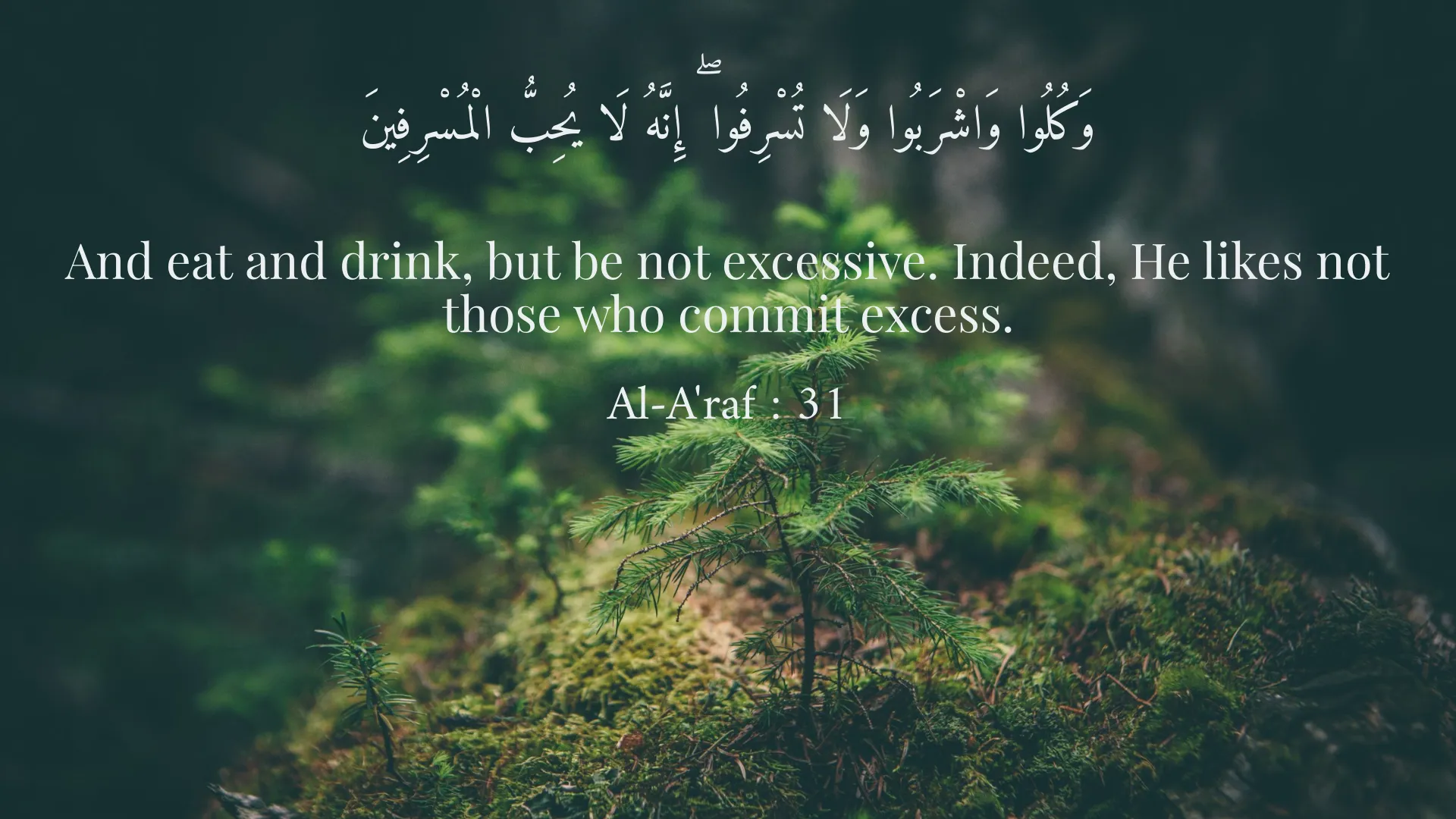Quranic Answer

Extravagance and wastefulness are two traits that remain widely recognized as detrimental, both in socioeconomic contexts and within spiritual frameworks. The Holy Quran, which serves as the central religious text of Islam, outlines a comprehensive approach to prudent living, routinely condemning excessive behavior. In considering the verse from Surah Al-A'raf, verse 31, where it explicitly states, 'And eat and drink, but be not excessive. Indeed, He likes not those who commit excess,' we begin to understand the gravity with which Allah regards the proclivity toward wastefulness in consumption. It is paramount to recognize that Islam not only communicates disapproval of extravagance but also translates this sentiment into a decree for followers to embrace moderation in all aspects of life. Extravagance is defined as the act of spending money or resources in a way that is unnecessary and beyond one’s actual needs. The negative ramifications of such behavior ripple across individual lives and extend into the broader social fabric. At a personal level, excessive spending can lead to financial instability, increasing debt, and ultimately a loss of peace of mind. From a societal viewpoint, when individuals indulge in wastefulness, resources become scarce, leading to wider issues such as poverty, environmental degradation, and social inequality. Thus, the repercussions of waste extend beyond oneself and affect the community at large. This concern for communal welfare is further examined in Surah Al-Furqan, verse 67, which delineates the characteristics of righteous servants of God: 'And those who, when they spend, are neither extravagant nor miserly, and there is a medium between that.' This verse illustrates the balanced approach that Islam advocates in terms of financial matters. It does not endorse a stingy lifestyle where one is reluctant to spend or share; rather, it calls for a moderate path—one that allows for generosity and helping others while simultaneously maintaining one’s own financial health. Moreover, while extravagance is often associated with material possessions and superficiality, it can also manifest in other realms of life such as relationships and lifestyles. The Quran advises a philosophy of simplicity and moderation that prioritizes meaningful connection over ostentatious displays of wealth. In Surah An-Nisa, verse 36, the text states: 'And your Lord has decreed that you not worship except Him and to parents, good treatment.' Here, it emphasizes that showing love and kindness toward one’s parents and others should overshadow the pursuit of luxury or excessive materialism. Through this decree, Islam promotes the idea that the quality of relationships is far more valuable than outer displays of affluence. In modern contexts, where consumerism is rampant and material displays are often equated with success, the lessons from the Quran serve as a critical reminder. They call for a paradigm shift where individuals reflect upon their values and assess whether their pursuits align with the Quranic view of moderation. The social pressures to consume lavishly can often overshadow the simpler joys that come from leading a life grounded in community and spirituality. Islamic teachings suggest that leading a life marked by moderation cultivates not only individual well-being but also social cohesion. When individuals prioritize their needs and those of their families while engaging in frugal yet meaningful expenditures, they foster a sense of belonging and responsibility toward others. This social contract mirrors the essence of Islamic ethics—leading to a community that thrives collectively rather than being divided by jealousy and competition over material wealth. Embracing frugality is therefore not merely a financial strategy; it is also a spiritual commitment to adhere to the fundamental principles of Islam. Viewing extravagance through this lens, we can understand it as a form of arrogance—a failure to recognize one’s dependence on God and a disregard for the greater good of society. When Allah warns against extravagance, He is essentially calling for mindfulness, gratitude, and respect for the resources that have been provided. In conclusion, the Quranic viewpoint offers a profound critique of extravagance and wastefulness, reflecting an understanding of their harmful effects on both individuals and society. By advocating for moderation in matters of spending, Islam urges believers to cultivate a lifestyle that embodies balance, respect for others, and an appreciation for the resources granted by God. The path of simplicity and moderation not only leads to financial stability but also enhances personal relationships and social harmony, offering a holistic approach to living in a complex world. Ultimately, the Islamic attitude towards extravagance serves as a vital reminder to resist the temptations of excess and instead invest in meaningful pursuits—those that enrich both the spirit and social fabric.
Related Verses
وَكُلُوا وَاشْرَبُوا وَلَا تُسْرِفُوا ۖ إِنَّهُ لَا يُحِبُّ الْمُسْرِفِينَ
And eat and drink, but be not excessive. Indeed, He likes not those who commit excess.
Al-A'raf : 31
وَالَّذِينَ إِذَا أَنفَقُوا لَمْ يُسْرِفُوا وَلَمْ يَقْتُرُوا وَكَانَ بَيْنَ ذَٰلِكَ قَوَامًا
And those who, when they spend, are neither extravagant nor miserly, and there is a medium between that.
Al-Furqan : 67
وَقَضَىٰ رَبُّكَ أَلَّا تَعْبُدُوا إِلَّا إِيَّاهُ وَبِالْوَالِدَيْنِ إِحْسَانًا
And your Lord has decreed that you not worship except Him and to parents, good treatment.
An-Nisa : 36
Short Story
One day, Mansoor, a man of good character and simple living, resided in a village. He always maintained balance in his behavior and expenditures. When his friends wanted to throw a grand celebration, Mansoor urged them to focus on cooperation and love instead of extravagance. With his influence, their celebration turned into the most magnificent and friendly gathering. They realized that true joy lies in simplicity and friendship, not in extravagance.